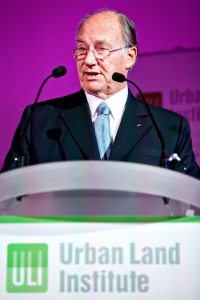2011 J.C. Nichols Prize Winner—His Highness the Aga Khan 2011-10-28
An unparalleled leader in development, cultural preservation and philanthropy, largely benefiting poor and marginalized communities in Asia and Africa, is being honored with the 2011 Urban Land Institute (ULI) J.C. Nichols Prize for Visionaries in Urban Development. His Highness the Aga Khan, Imam of the Shia Imami Ismaili Muslims and leader of the nondenominational Aga Khan Development Network (AKDN), was named the 2011 Nichols Laureate today at ULI's Annual Fall Meeting and Urban Land Expo in Los Angeles.
The ULI J.C. Nichols Prize recognizes an individual, or a person representing an institution, whose career demonstrates a commitment to the highest standards of responsible development. The $100,000 prize honors the legacy of legendary Kansas City, Missouri, developer Jesse Clyde Nichols (1880-1950), a founding ULI member who is widely regarded as one of America's most influential entrepreneurs in land use during the first half of the 20th century . . .
Continue reading the entire announcement: http://bit.ly/u2WKRc
The jury for the 2011 ULI Nichols Prize for Visionaries in Urban Development chose the Aga Khan as the 2011 laureate because of his strong leadership, over more than 40 years, of a stunning variety of development and philanthropic endeavors largely benefiting poor and marginalized communities in Asia and Africa struggling to improve their living conditions. He leads a variety of entities comprising the Aga Khan Development Network, a nondenominational organization with an annual budget of $625 million for nonprofit development activity.
Among the nine agencies in the Development Network, two were of particular interest to the ULI jury:
◾The Aga Khan Planning and Building Services (AKPBS), with its award-winning sustainable construction program in earthquake-prone northern Pakistan, and a variety of housing design, construction, village planning, and environmental remediation services.
◾The Aga Khan Trust for Culture (AKTC), which includes the Aga Khan Award for Architecture and the Historic Cities Support Program.
One project undertaken by the Aga Khan Trust for Culture, the restoration of Altit Fort in Hunza, Pakistan, received an Award of Distinction at the 2011 UNESCO Asia-Pacific Heritage Awards for Culture Heritage Conservation. The 900-year-old fort is an important cultural monument and tourist attraction. Conservation work included repairing structural defects, replacing roofs, treating wood decay, and providing appropriate lighting. At least as noteworthy were the associated community development efforts. According to the Aga Khan Development Network:
“Because Altit residents were abandoning the traditional houses and constructing
new houses on valuable arable land, the restoration of the village proceeded
before restoration of the fort. A water filtration system . . . was one of the
important improvements that drew inhabitants back to the traditional settlement.”
In a time of both unrest and great hope in the Arab and Muslim worlds, the jury was moved to honor a leader who has raised the quality of life in these regions without regard to nationality, creed, or gender. In particular, the Nichols jury took note of the Aga Khan’s decades of planning, building, and restoring communities and cultural sites, along with his sponsorship of the prestigious Aga Khan Award for Architecture. The award is given every three years to projects that set new standards of excellence in architecture, planning practices, historic preservation, and landscape architecture. The selection process emphasizes architecture that not only provides for people’s physical, social, and economic needs, but also stimulates and responds to their cultural expectations.
For more information about the Aga Khan, visit: http://www.akdn.org
This entry was posted in Nichols Prize Winners by Leigh Franke. Bookmark the permalink.
- 6573 reads
 Ismaili.NET - Heritage F.I.E.L.D.
Ismaili.NET - Heritage F.I.E.L.D.